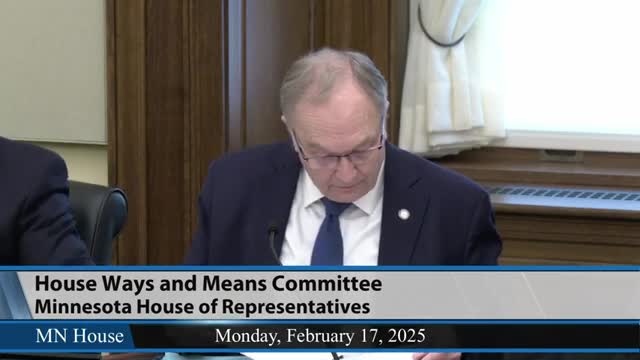Minn. lawmakers probe fiscal-note process after paid-family-leave estimates shift
Get AI-powered insights, summaries, and transcripts
Subscribe
Summary
Members of the Minnesota House Ways and Means Committee spent a session reviewing how fiscal notes are produced after contested fiscal estimates for the state—s paid family and medical leave program changed between the 2023 enactment and analyses prepared in 2024.
Members of the Minnesota House Ways and Means Committee spent a session reviewing how fiscal notes are produced after contested fiscal estimates for the state—s paid family and medical leave program changed between the 2023 enactment and analyses prepared in 2024.
The committee heard a detailed presentation from Legislative Budget Office Director Christian Larsen, who used the paid-leave law (Laws of Minnesota 2023, ch. 59) and House File 5363 as a case study to explain why setting a consistent baseline, documenting agency assumption changes and clarifying when actuarial estimates are used matters for accurate, timely fiscal notes.
Director Christian Larsen, director of the Legislative Budget Office, told the committee the office concluded the October 2023 actuarial analysis was the most appropriate baseline for 2024 fiscal notes because it was the most recent, consistent estimate available and because the 2024 fiscal notes relied on updated actuarial work by Milliman. "If you have a consistent methodology between those two ways of measuring, then you're really measuring the changes," Larsen said. He also described three principal problems that complicated the 2024 paid-leave fiscal notes: an unclear baseline, a post-enactment refinement in DEED—s interpretation of a seven-day qualifying period, and DEED—s use of permissive authority to adjust the first-year premium rate.
Larsen summarized the second problem this way: the October actuarial work and later DEED interpretations treated the first seven days of an eligible leave as unpaid, while later 2024 bill language and some members' expectations treated those days as paid. "Those first seven days were not actually paid days and you didn't start receiving benefit payments until day 8," Larsen said of DEED's refined interpretation; including those days as paid in later proposals added cost relative to that baseline.
The third issue drew sustained scrutiny: the premium-rate assumption. The 2023 law set an initial contribution rate written as 0.7% of taxable wages, with a statutory formula for future adjustments. The October 2023 actuarial scenarios included an alternative first-year assumption of 0.78% (and small variations thereafter). DEED told the committee it intended to use its permissive statutory authority to set an initial rate consistent with the actuary's recommended scenario; committee members said that reset effectively changed the baseline and represented a significant, de facto first-year rate increase that had not been explicit in the statute.
Deputy Commissioner Evan Rowe of the Department of Employment and Economic Development said DEED used the 0.78% assumption to provide a stable, actuarially sound basis for comparing proposed changes. "The actuarial analysis showed ... the commissioner must adjust the premium rate to make the program actuarially sound," Rowe said, explaining that Milliman—s scenarios were intended to reduce large year-to-year swings that would otherwise complicate comparison. Rowe added agency staff did not prepare slides for the hearing but told the committee DEED will work to communicate assumptions earlier in future rulemaking and legislative cycles.
Members of both parties pressed LBO and DEED on process and timing. Representative Nash and Representative Robbins said the LBO was placed under severe time pressure as bill language and actuarial scenarios changed rapidly late in session. Larsen acknowledged the office is relatively new (six sessions) and described practical limits: the office can withhold approval of a fiscal note if it does not meet the uniform standards and procedures, and it has authority to release an "unapproved" fiscal note with a cover memo, but he said the office has been cautious about using that route for timing and communication reasons.
Larsen said the LBO recommends several process changes: earlier LBO--agency communication about required inputs; supplemental LBO memos that show the difference between the old baseline and the new baseline; clearer documentation when agencies exercise permissive rate-setting authority; and consideration by the Legislative Budget Office Oversight Commission of a working group to address cases where assumptions change substantially between sessions.
Minnesota Management and Budget—s State Budget Director Anna Mingi told the committee MMB does not have a statutory role in producing fiscal notes but reviews them for consistency with the biannual budget and economic forecast. MMB confirmed it will begin publishing an estimate for the paid-leave fund in the twice-yearly forecast so future fiscal notes have a clearer published baseline for comparison. "After the events last year with the ... evolving baseline for the PFML program, MMB has worked with DEED, so we now do publish an estimate of the paid family leave fund with our twice-a-year budget forecast," Mingi said.
Committee members pressed for practical changes, including earlier engagement on assumptions, better notation on fiscal notes when LBO—s review flagged substantive differences, and clearer guidance on the scope and priority of "unofficial" or classified fiscal-note requests. Several members urged the LBO to make its review status more visible to lawmakers when a fiscal note rests on contested assumptions.
The committee did not take formal action on legislation at the hearing; the day—s discussion was framed as a process-review meeting rather than a bill vote. Larsen provided an overview of the LBO staff capacity (he said the office has 18 staff) and said the office will prioritize significant, complex fiscal notes for additional analysis where resources allow.
The hearing closed with members and agency officials agreeing to pursue earlier and clearer communication, and potential procedural changes through the LBO Oversight Commission. "We should all exercise restraint" in requesting fiscal notes when bills are unlikely to advance, Representative Stevenson said, urging members to conserve staff capacity. With that, Chair Torkelson adjourned the committee.
